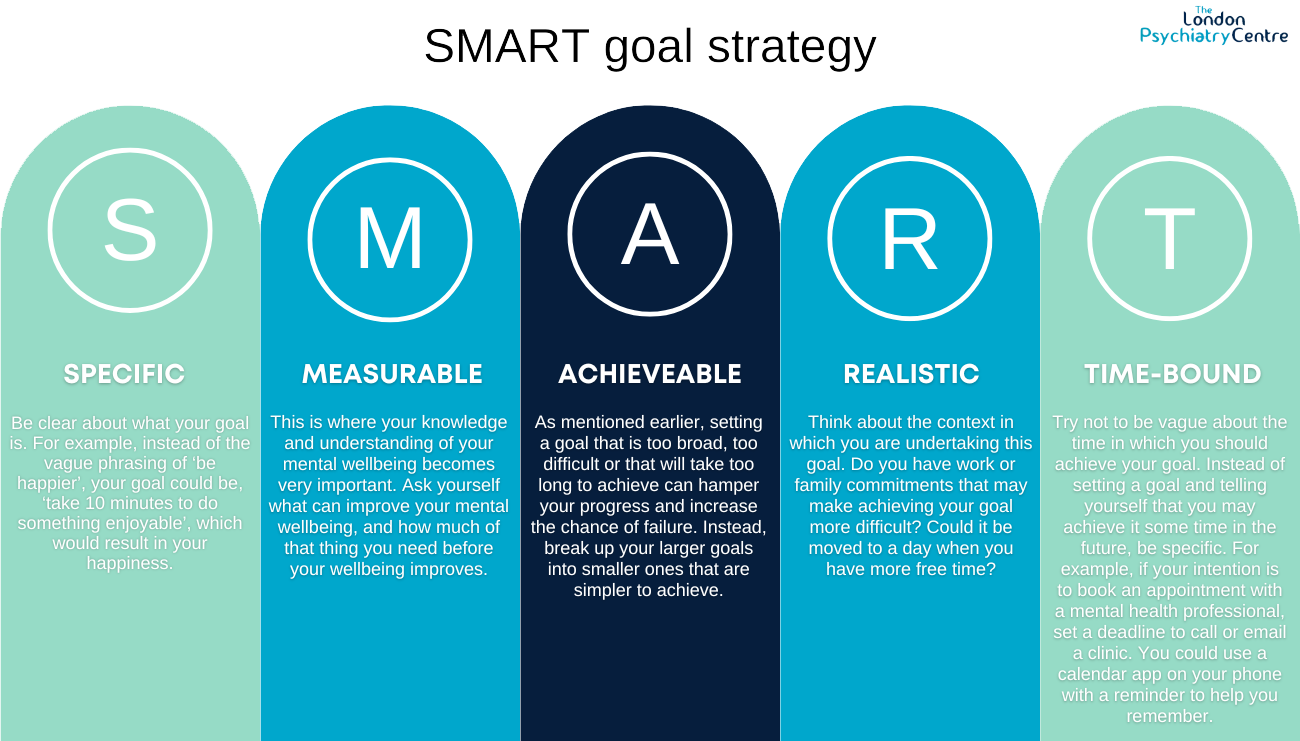
Goal Setting: A Practical Way To Improve Your Mental Health
Goal setting may seem like an intimidating concept at first, but it can make a huge difference in the way we perceive our mental health journeys, and the steps that we need to make in order to improve our wellbeing.
When you are experiencing a mental health issue, such as depression, it is easy to view balanced wellbeing as a far-off concept that will take a long time and plenty of hard work to achieve. While it’s true that time and effort are naturally part of the mental health journey, you can change the way in which you perceive your journey by turning your ultimate end goal into many smaller goals that you can achieve as you go along.
Dr Christos Kouimtsidis, Consultant Psychiatrist at The London Psychiatry Centre, explains, “When goals are met, healthy habits are reinforced and these can be used to fuel further progression throughout your mental health journey. This is due to the dopamine boost that we achieve from meeting a goal; our bodies seek dopamine, and will naturally be more inclined to fulfil goals that we know will provide us with a boost of this neurotransmitter. In contrast, going for a long time without achieving a goal may decrease motivation, meaning we are less likely to progress with wellbeing improvements.”
In this article, we explore how you can make goal-setting a part of your mental health journey.
How Do You Set Goals That Benefit Your Mental Health?
You can begin goal setting yourself as soon as you feel the motivation for change. Alternatively, you may come across the activity in a session with your mental health consultant.
There are no hard and fast rules to goal setting, including the goal itself or the timeframe in which you must achieve it. So where do you begin? Here are some tips to help you.
Think small: While it might be difficult to visualise yourself in the peak of wellbeing in however many years’ time, it is easier to envision yourself as happier, less anxious and more relaxed later in the same day once you have completed a smaller goal.
For example, today’s goal could be to go for a walk in the fresh air, meditate for 10 minutes, or detox from technology for an hour. These small goals are easier to perceive and achieve, and the benefits should be simpler to visualise.
Write down your goals: By writing your goals down, you create a visual aid that will help you achieve them. Put your written objectives in a place where you can see them regularly; this will remind you of what you intend to accomplish, promoting motivation and consistency.
Share your goals with trusted friends or family members: A study by Dominican University found that over 70% of those who shared updates about their goals with a friend reported successful goal achievement, compared to those who did not.
This is because sharing goals with others promotes accountability. It is easier to ‘cheat yourself’ and put off achieving a goal, than it is to admit to a friend that you haven’t been on top of your mental health.
If you struggle to motivate yourself, try sharing your goals and your progress with a trusted friend or family member. They may be key in helping you progress in your journey.
Don’t be hard on yourself if you fail: Every day is different, and on some days you may be unable to progress in the way that you intended. However, it is important to take your journey one day at a time, and use the above tips to help you regain your footing once you are ready to join your wellbeing path once again.
If you do happen to miss out on achieving a particular goal, or you are unable to complete it within a certain timeframe, try to reflect on why this happened, and perhaps make adjustments to make your goal more attainable the next time you are ready to try again.
The SMART goal strategy
The ‘SMART’ system of goal setting was first published in a business magazine in the 1980s; however, it can be applied to goal setting in any area of life. Aligning your goals with the SMART system can make them easier to visualise and ultimately achieve. The acronym stands for:

Be aware that tight deadlines can sometimes cause excess stress. Be realistic, as above, and set yourself enough time in which to achieve your goal.
Is There A Downside To Goal Setting?
We all fear failure, and this fear and anxiety can be a downside to goal setting. In addition, the pressure to get better for yourself and your loved ones can further impact your mental health. This is why it is important to be gentle to yourself in your approach to goal setting.
While we have outlined some simple tips to help you in your mental health journey, your goals and the way in which you set them is completely up to you. You may choose goals that centre around one area of your wellbeing, or you may feel up to tackling a number of goals in a short space of time.
How We Can Help
Goal setting is a common activity in cognitive behavioural therapy (CBT), and your mental health consultant will be able to help you in your decisions about the goals you want to achieve and how to get there. You may even find it helpful to create goals specific to your therapy sessions, such as talking about a difficult topic in your life, or competing out-of-session work that will help towards the next session.
If you are considering therapy, feel free to contact our friendly team at The London Psychiatry Centre using the below details:


